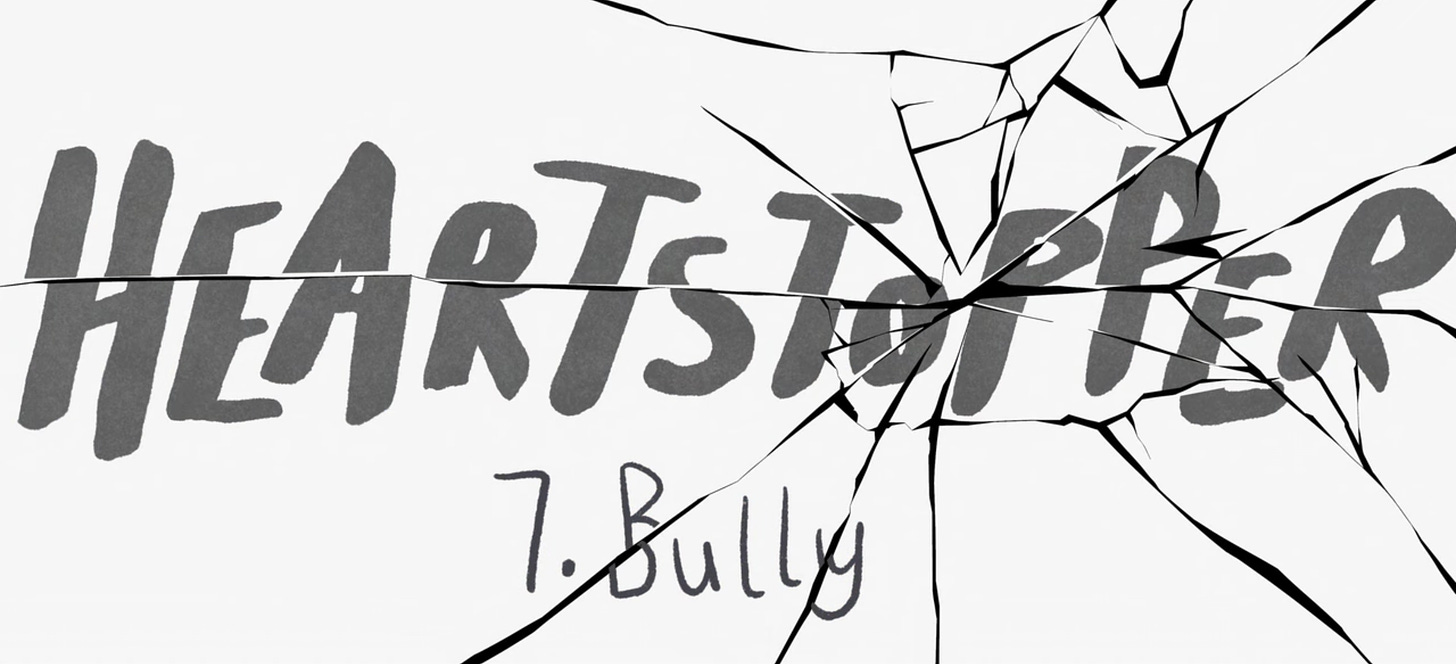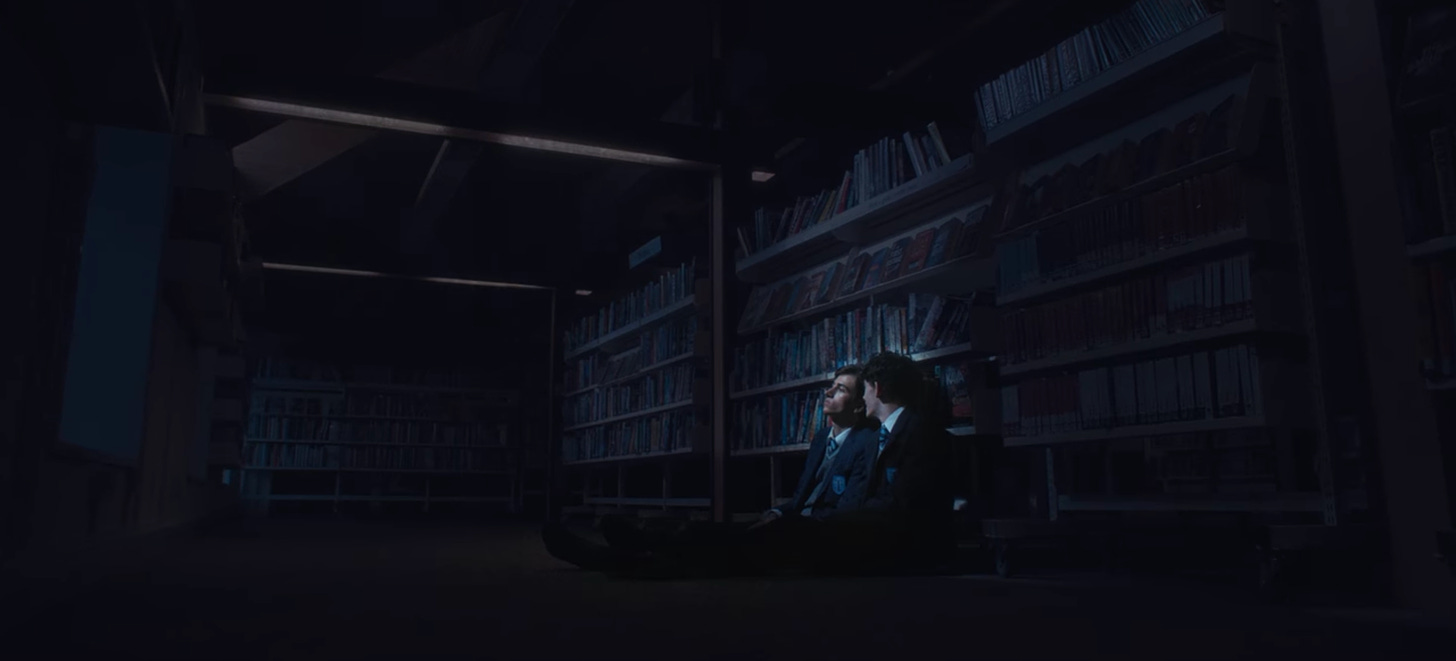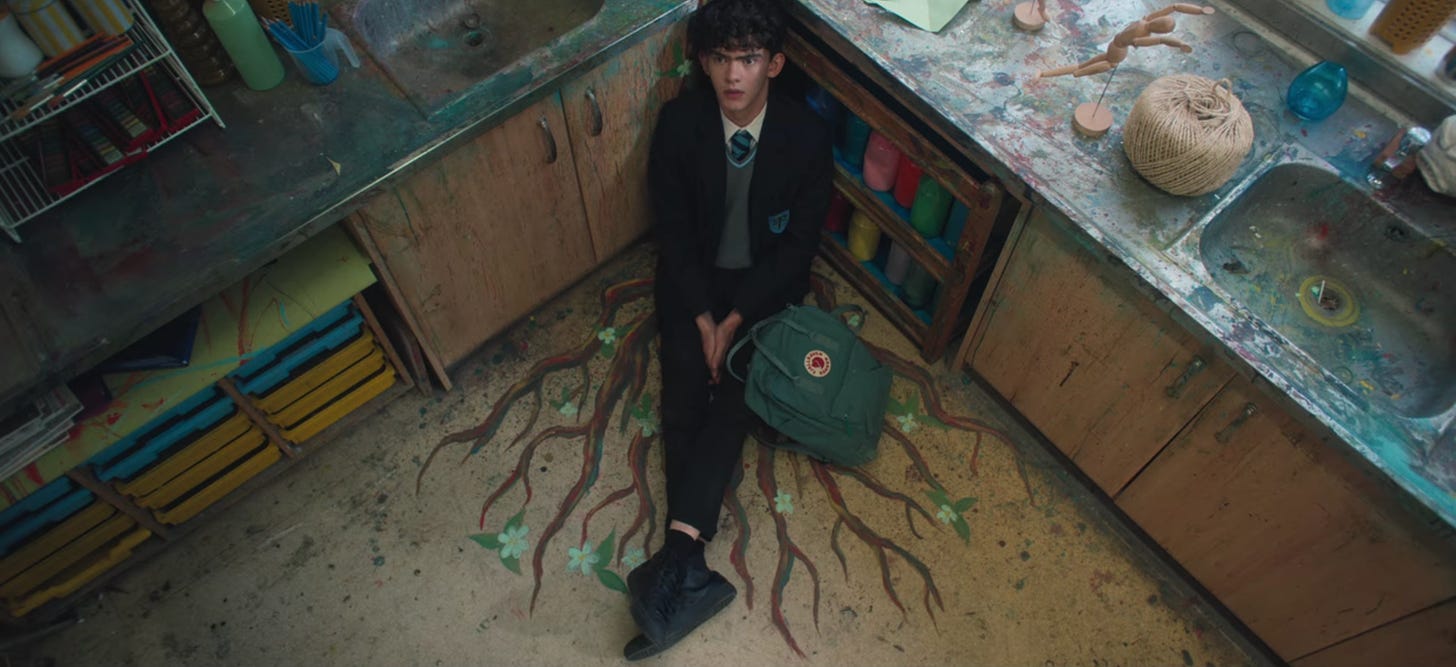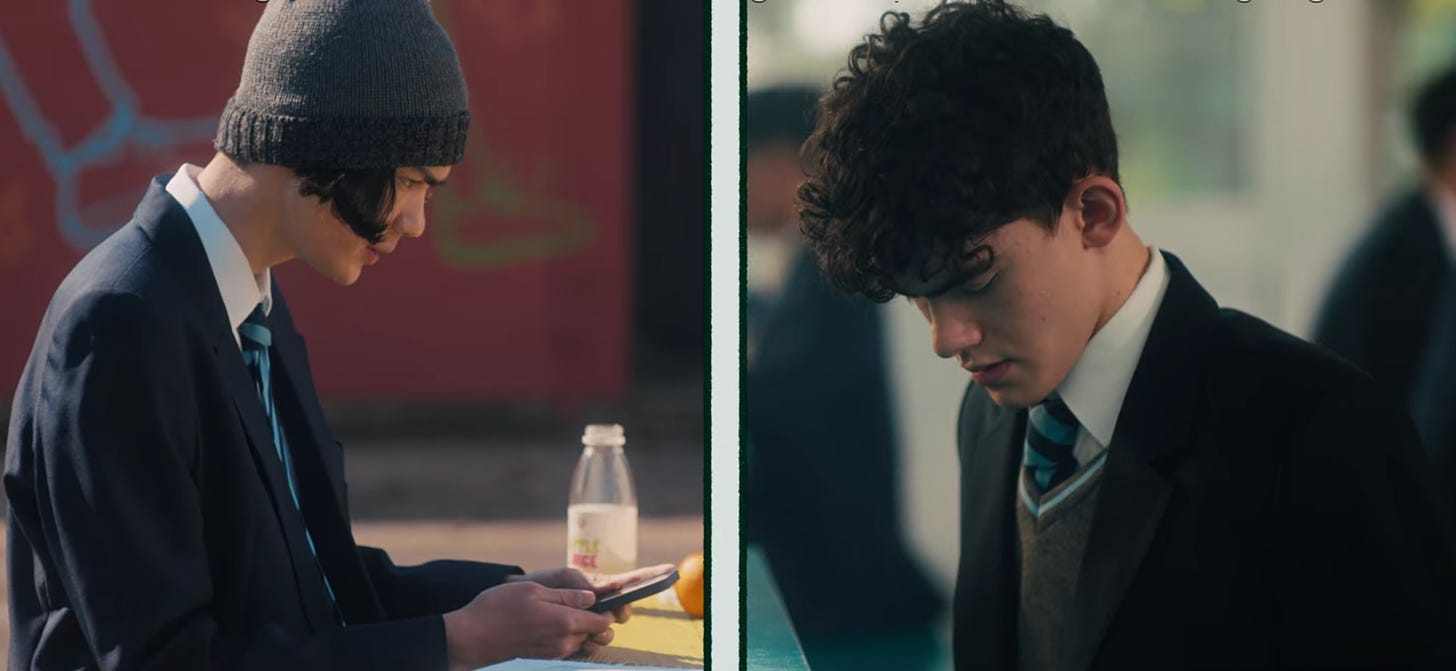Review: Heartstopper, "Bully" | Season 1, Episode 7
Pushed a bit to the sidelines in this adaptation, Charlie and his past trauma are recentered in the season's penultimate episode
The biggest impact of the fleshing out of Heartstopper’s second volume has been the decentering of Charlie within the narrative. This isn’t to say that Charlie’s character arc is being poorly adapted from the graphic novels: it’s just not being expanded significantly, whereas Nick’s coming out story is gaining more nuance, and you have expanded roles for Elle, Tara, Darcy, and Tao that are competing for story space as well. It’s a far cry from the books, where the first volume is so tightly in Charlie’s point-of-view and naturally anchors the rest of the story there in a way that the show destabilizes.
“Bully” is the first episode in a while that feels like it really returns to Charlie’s perspective as the central one, as we find him checking his hair in the mirror ahead of the next step in his relationship with Nick: spending time with his friends. While Charlie has shown some reluctance to accept Nick’s affections as genuine, he’s embraced their connection, and has at this point confided in most of his friends, as well as his sister. But after his sister reminds him that Nick’s friends don’t seem particularly nice, and after Charlie himself acknowledges that he doesn’t really know if they’re “together,” Charlie’s past re-emerges: a memory of him and Ben in the library, as Charlie makes the mistake of suggesting they’re boyfriends.
Ben and Harry are both the eponymous “Bully” in this episode, albeit in different ways. Unlike in the books, the show is explicit that Ben’s bullying of Charlie is a defense mechanism, first out of fear over being found out and now out of jealousy of the fact that he believes Charlie and Nick are together. There’s no doubt that the general homophobia from Harry and others that Charlie was subject to produced scars, but the most acute trauma is the way Ben treated him. It convinced him he doesn’t deserve to have a boyfriend, and that even when someone like Nick comes along that genuinely cares about him, he sees any of the complications that come from that as his own fault, as though he somehow caused Harry to be a dickwad.
Nick knows that Charlie went through a lot, and we’ve seen him flash back to his own culpability during that period: he feels responsible for not doing more to stop these bullies both then and now, even if Charlie feels like it is his cross to bear. The moment that really resonates in the books—and which surprisingly isn’t as punctuated in the series—is when Nick hears Charlie and Harry use the same excuse for what’s happening: Charlie insists that he’s used to it, and then Harry parrots the same line as if that makes it okay. While Nick might actually physically strike Harry when he goes all-in and uses a slur, in the book I always felt like the moment Nick really commits to fighting him is when he realizes how much damage this type of bullying has done to Charlie’s psyche. And while Nick does emphasize this as his primary reason for starting the fight, I was really expecting them to zoom in and capture his realization in the moment, instead of kind of blazing past it to get to the scuffle (which lacks the same clarity of the book’s “Nick throws the first punch, but flinches, giving Harry space to punch him”).
With its more narrow focus, the books resolve this situation fairly quickly: Nick does keep it from Charlie initially, but he comes clean the next day, and they mostly just laugh it off as Harry having needed a punch in the face. Here, though, what the books frame as a moment where Nick is insecure about revealing his violent outburst to Charlie is reframed as Charlie writing and deleting texts that they should break up, because he doesn’t want someone to have to share in his pain. At this point in the books, Charlie shows signs of insecurity, but Oseman here is recentering his trauma as something that will inflect every choice he makes, and amplify every hiccup like he experiences here. If choosing between fight and flight, the latter is Charlie’s instinct, for reasons that Nick is working hard to understand but which Charlie doesn’t feel should be someone else’s responsibility.
Speaking of fight or flight, Tao comes to some healthy realizations about how he’s approaching his war of words with Harry, and the fact he may have failed to realize how overcompensating for Charlie’s past trauma might actually be creating greater risk. But in the same conversation with Elle, he stumbles into the truth about Charlie and Nick, and once Elle confirms it—what choice did she have?—he forgets his lesson entirely and basically ends their friendship with a DM the second Charlie says he’ll be delayed to join him for lunch because he’s meeting up with Nick.
I realize that his emotional state is necessary to prompt the fight with Harry, and I can understand his frustration with being the last to know about Nick and Charlie being together, but I do feel like Tao’s emotional swings are a piece of this adaptation that isn’t working for me. For him to go from a moment of self-awareness to basically writing off Charlie entirely was extreme: I can get him wanting to write and send that message, but actually sending it was impulsive to a point that it registers as the character being turned into a loose cannon solely so that the story could have an episodic cliffhanger that the book lacks. There’s no point in the story where Nick and Charlie’s relationship ever actually feels in danger in the books, but that danger is critical to extending the narrative tension, and thus we have Charlie moments away from ending their relationship just before the fight proves a distraction and its own fireworks to resolve in the finale.
Outside of Tao, though, I do feel like “Bully” lays the necessary groundwork to sell how Charlie’s lingering doubts and trauma from his experience with Ben and all of the bullying of the previous year would leave him vulnerable to the type of thinking that he nearly gives into. Heartstopper may not be trauma porn, but it is leaning into the past traumas we’re told occurred in order to flesh out the narrative, here bringing Charlie back to the forefront in time to see how the events of the finale bring each of these pairs into conversation with one another one last time (this season).
Stray (Adaptation) Observations
Okay, so I get that extending Ben’s role in the story creates more opportunities to flesh out his dynamic with Charlie, but I do question Nick not even trying to distance himself from Ben on a daily basis, knowing what he does about what happened there. The season needed a moment where Nick suggested taking more dramatic action and Charlie stopped him, either because he didn’t want to create a scene (consistent with his feelings about Tao’s fight with Harry) or because Ben doesn’t deserve to be outed even if he’s being a dick.
In light of Oseman’s comments about imagining fleshing out new characters like Isaac and Imogen in a second season, I’d be really curious whether Ben is on that list, and if his own version of self-acceptance and growth could be a story worth telling.
The “Char” scene is pretty much line-for-line and frame-for-frame from the book, although it’s interesting how revisiting it in both forms emphasizes the other dynamics of the scene that start to emerge more in Book 3 (especially in conversation with another scene elsewhere in the episode that’s not in the books).
When you’re barreling through a graphic novel, you don’t necessarily stop to reflect as often as you might otherwise. And so I was struck by how close Nick gets to telling his mother about dating Charlie in the car: it’s clearly the moment she starts to suspect something, and Colman plays her question as an invitation, with Nick giving it a solid thought but in the end letting it pass by. (I’m also glad they kept Nellie in the scene, even if they put her on the floor so they could cut around her in the two-shot).
Elle revealing that Harry was also one of her bullies at Truham isn’t surprising, although there’s a clear pushback at suggesting he’s some grand evildoer: she emphasizes that he was far from alone, and thus exactly the garden variety dickwad that people like Elle and Charlie are used to even when they shouldn’t be. The books don’t shy away from this reality, and in some ways make Harry and Ben even bigger villains, but the characters aren’t brushing it off as easily here, and it’s a change that helps the show feel more grounded and less like a romantic fantasy, which I appreciate.
Not sure they needed to have the insert of Elle’s drawing for Tao getting stepped on in the middle of the fight to get the point across, but it was a nice touch.








This one felt like a small misstep, pretty much for the reasons you cite. Tao friend breaking up with Charlie and Charlie almost breaking up with Nick with the two fights felt like the show veering into melodrama in a way that it has avoided up until now. Maybe it points to a somewhat bigger problem with the pacing of the show: Once Charlie and Nick are together the obvious next step is for Nick to come out, and everything that delays that needs to justify its existence in the narrative. The previous three episodes have handled the slow play pretty well, but this one as the darkness before the dawn felt artificial.
I'm kind of changing my mind about the casting. These actors are fine for the roles as written (mostly - I still think Joe Stockton looks too old, older that Kit Connor anyway). But the script makes them sound and act more like old 16-17s than young 15-16s. Just aging up the characters on paper would have relieved a lot of that dissonance.
Also, where's Isaac? String? String? Where the fuck is Isaac?